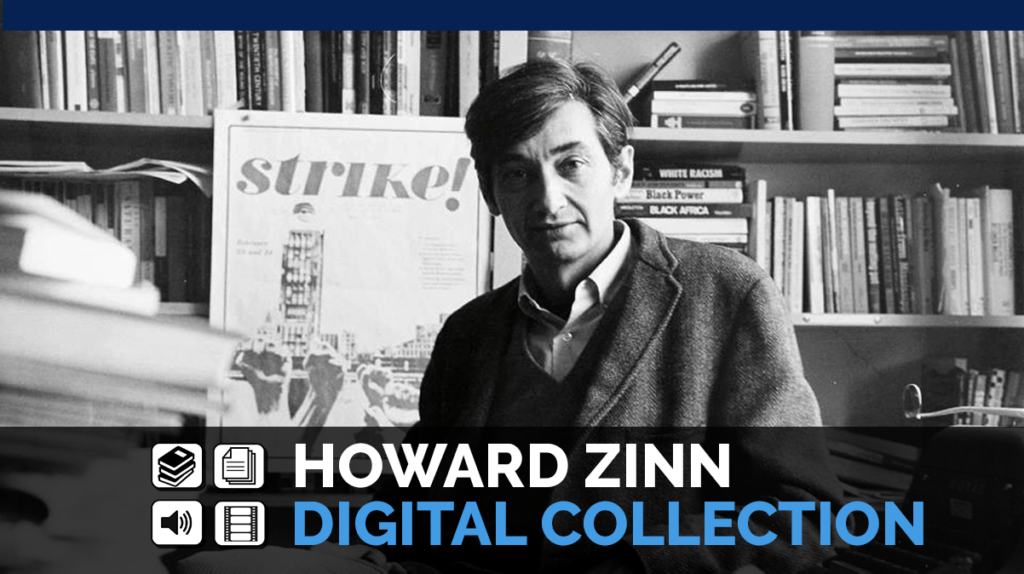Our Favorite Teacher Series
Howard Zinn taught at Spelman College and Boston University where he had an extraordinary influence on his students’ understanding of history and their role in the world. The “Howard Zinn: Our Favorite Teacher” series highlights Zinn’s lasting impact as a professor.
David Schaff’s Reflections
 I first met Howard during a building occupation at Boston University in 1971. He was already known as a leader and orator in the Anti-War movement and author of many influential books on the war. But, his classroom presence is not what I’m remembering today. I know the classroom was the forum asked for in these remembrances, but I would like to draw people’s attention to the real classroom—at least the classroom that counted for Howard. It’s one thing to talk in class about the powers that be, how they came to power, what has been and should be done about it. But it’s another thing to do something about it oneself. In the spirit of education via the “act,” one of my fondest memories of Howard’s teaching is his advocacy for us to stand up for our beliefs on the picket line so to say. And the specific picket line I have in mind is the great BU strike of 1980.
I first met Howard during a building occupation at Boston University in 1971. He was already known as a leader and orator in the Anti-War movement and author of many influential books on the war. But, his classroom presence is not what I’m remembering today. I know the classroom was the forum asked for in these remembrances, but I would like to draw people’s attention to the real classroom—at least the classroom that counted for Howard. It’s one thing to talk in class about the powers that be, how they came to power, what has been and should be done about it. But it’s another thing to do something about it oneself. In the spirit of education via the “act,” one of my fondest memories of Howard’s teaching is his advocacy for us to stand up for our beliefs on the picket line so to say. And the specific picket line I have in mind is the great BU strike of 1980.
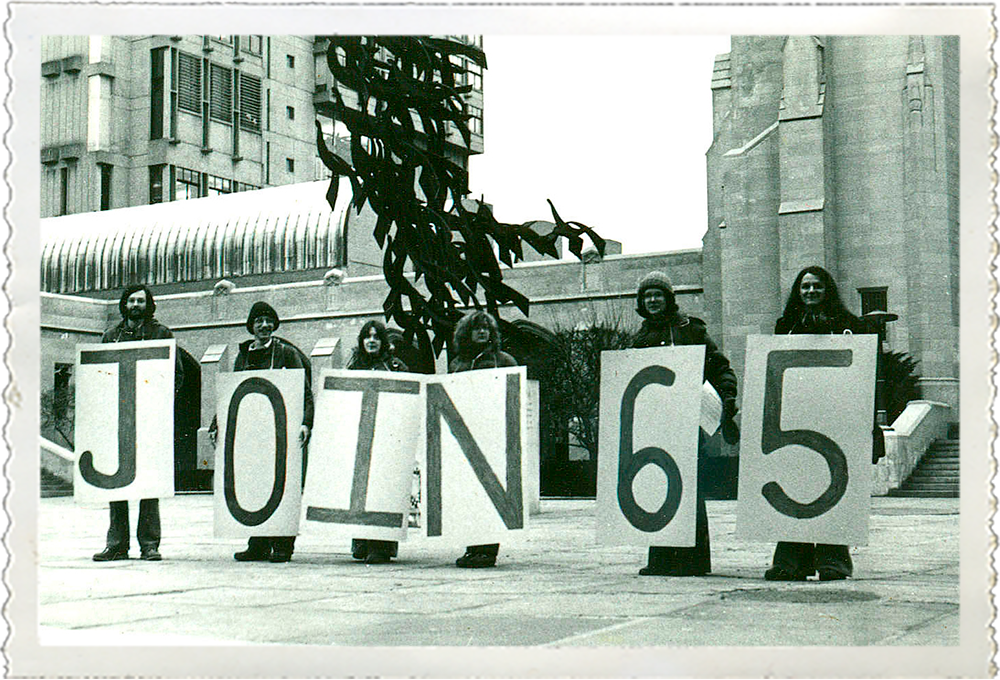
Since 1971, the year John Silber arrived at BU as its president, the BU faculty, staff, and students found him a very repressive administrator. Silber had a yearning for complete control over the university—including his attempts at attacking Howard’s reputation, something the present president of Purdue University resurrected just a few weeks ago by telling the world what he deemed is proper education. That “proper education” didn’t include Howard’s famous book, A People’s History of the United States, which he wanted to ban. But back in 1980, as if orchestrated in a splendid harmony, Howard’s A People’s History came out just as the faculty and staff struggles resulted in their unionization (AAUP and District 65) and going out on strike. Needless to say, Howard was out on the picket line. At that time, I was a member of the BU Exposure collective (an independent student newspaper) and an organizer for the staff union having recently graduating from BU. It was during that strike that Howard gave me his book with an inscription that ended “to a fellow striker.”
Eventually, the faculty had settled with the university and signed a contract. As expected, the faculty returned to their teaching. The only problem was that the university made no deal with the still-striking staff. Nevertheless, the faculty returned—that is all except five faculty members who risked their jobs by refusing to cross the staff’s picket line, and Howard Zinn was one of the “BU 5.”
As must be his fate with university presidents (Purdue today), Silber threatened to fire Howard and the other four faculty members for their stance in solidarity with the staff workers. Those brave professors did not budge and ultimately, the all-powerful Silber budged himself. This was a lesson learnt on the picket line by all those who wanted to listen and a lesson learnt in no other way than “by example” as Howard would say. The BU community came out in complete support of the BU 5. This is not the place to give a history of that time period except to say that it epitomized how Howard took education out of the classroom and put it out there for all to see. What a great way to start off his book and what a great way to help staff workers start off their union.
BU 5 Ephemera
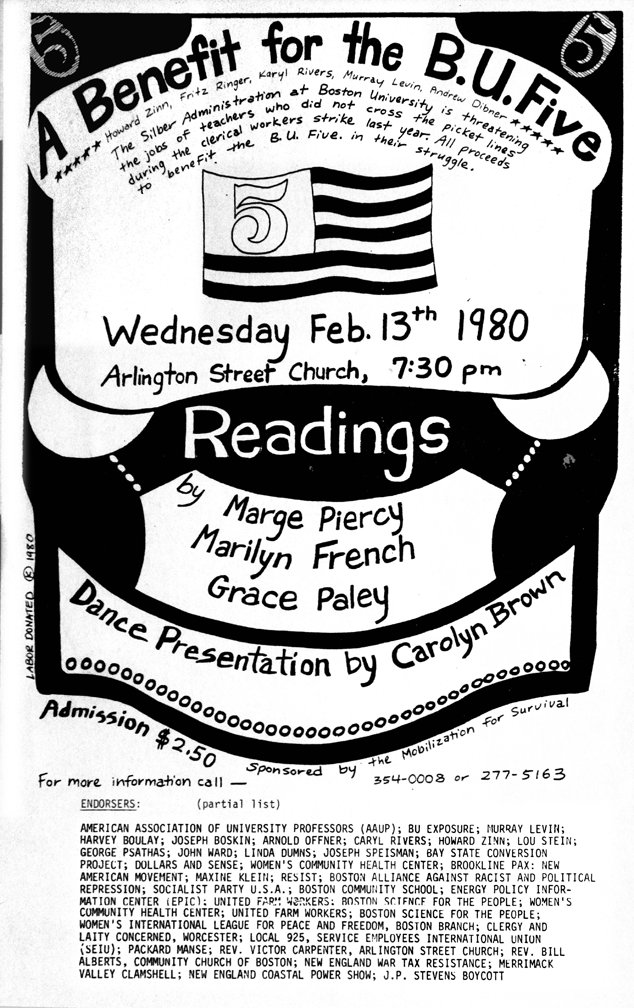 A poster for a BU5 benefit.
A poster for a BU5 benefit.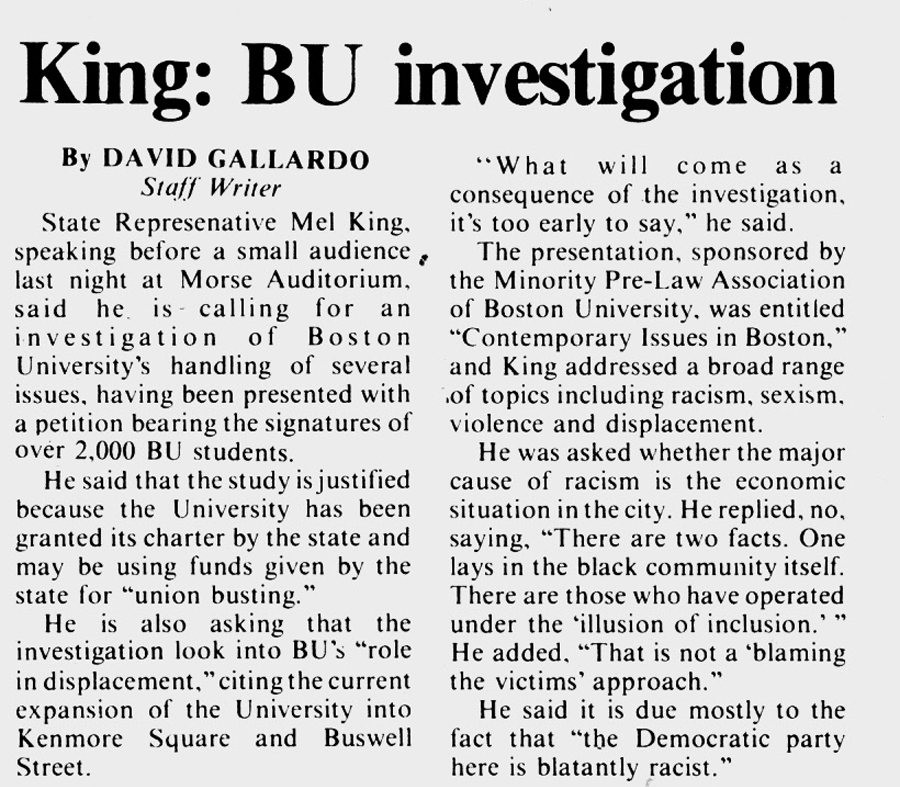 Newsclip about the BU5 investigation.
Newsclip about the BU5 investigation.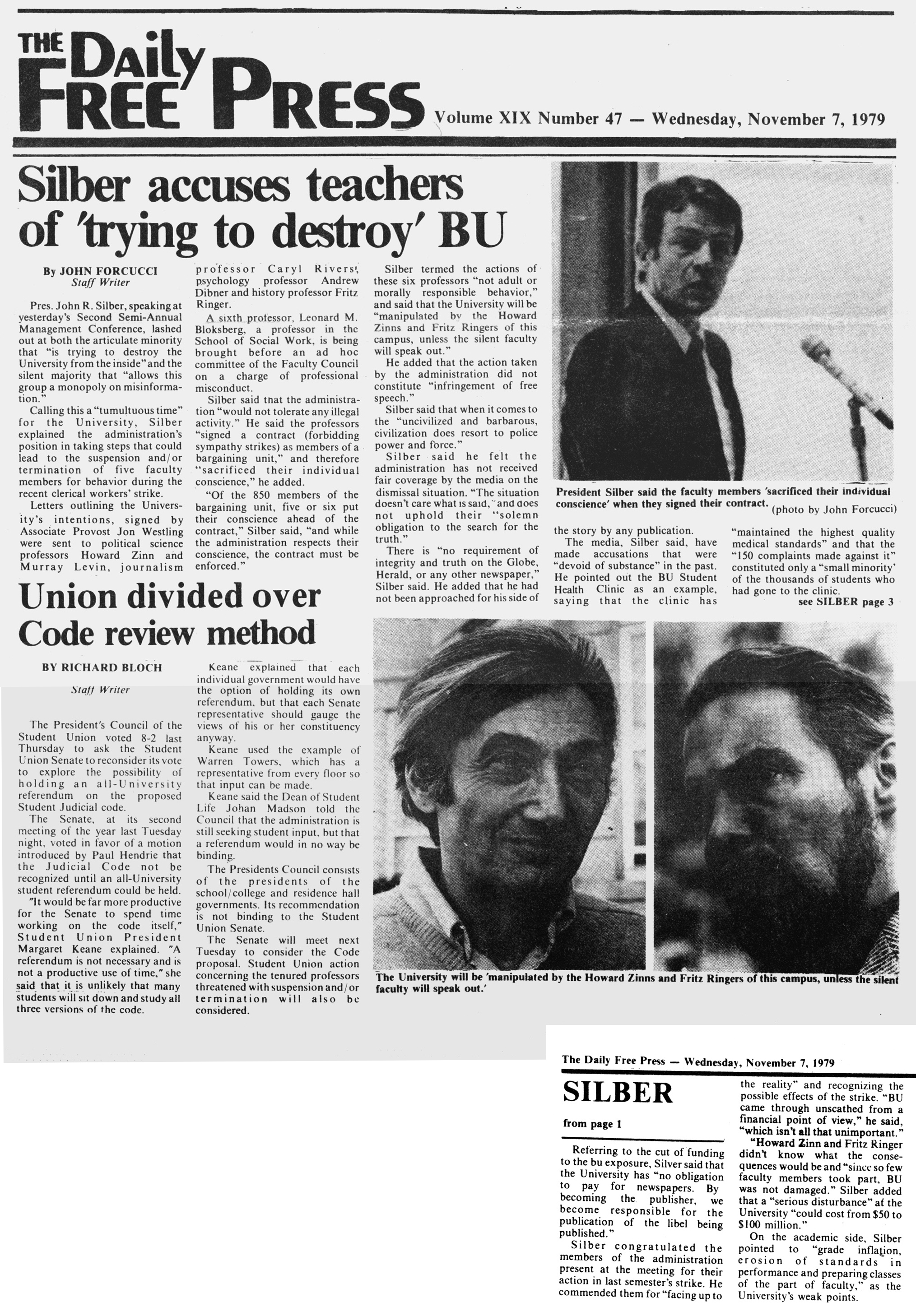 Daily Free Press: Silber accuses teachers of “trying to destroy” BU
Daily Free Press: Silber accuses teachers of “trying to destroy” BU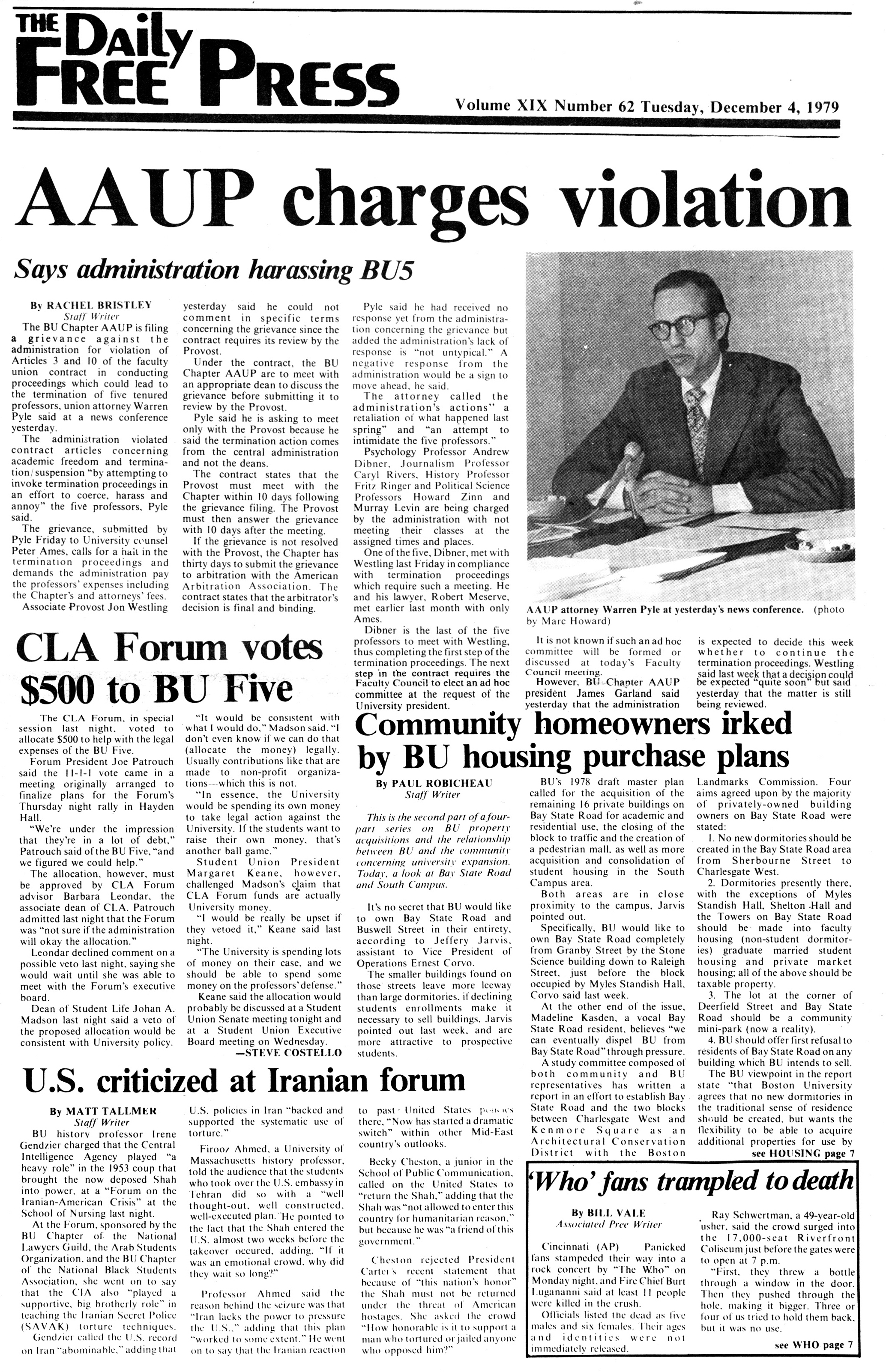 Daily Free Press: AAUP charges violation; Says administration harassing BU5.
Daily Free Press: AAUP charges violation; Says administration harassing BU5.
Jumping many decades ahead, as part of my job, I present a history of the union history movement since the Haymarket Massacre. I have all sorts of people from the local community participate by reading speeches and putting on brief skits around the events I’m narrating. (One lesson I learned from Howard was that participation in our democracy is essential.) I sent Howard a DVD of my first recorded presentation. Soon after I sent the DVD, Roz, his beloved wife, had died. I was surprised, given Roz’s death, that he would write back. But he did and was generous in his praise of our efforts putting on this history—the most important thing I do in spite of my job according to Howard. I thought I would miss Howard, but the more I organize and the more I can inspire others to join in an empowering movement, the more I can hear Howard’s words—his lessons behind me and guiding my way.
Zinn’s Letter of Invitation to Reading of a Marx in Soho
21 March, 1990
Dear Friends:
You now have a second change to miss the reading of my play, Marx in Soho, which was cancelled last month because of the snowstorm. It will now take place on Sunday evening, April 15th, , same place, same time (7:30 P.M. at the Mass. College of Art, 621 Huntington — a few blocks west of the Museum of Fine Arts, on the 5th floor, Studio 540). On Sunday night, I am told, there is usually plenty of parking space on the street. Admission is free, which is a good idea, since a reading of a play is a much diminished version of a real performance (no set, no costumes, no music, actors with scripts) so be warned.
It is a two-act play, roughly two hours. After the first act, there will be a short intermission, and after the second act a discussion, for those who want to stay, with the playwright and the actors. It is a play “in progress”, meaning it is still being worked on, and will benefit from a blunt critique.
This is one of a series of Sunday night readings of new plays sponsored by Playwrights’ Platform, to whom I am grateful, and whose phone number, 9-5, is 254-4482.
There is a cast of seven, and the reading will be directed by Ted Kazanoff, who will also play Marx.
Howard Zinn
The Anchorage Occupy Movement
Howard is very revered by the Anchorage left and although they never had him as a professor, his influence shines through these people.
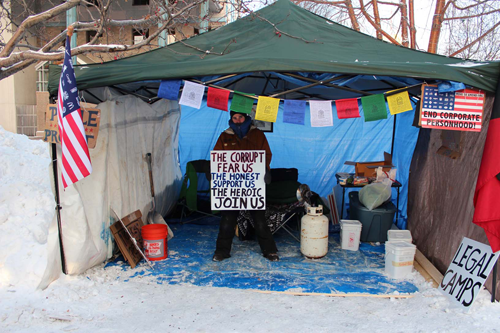
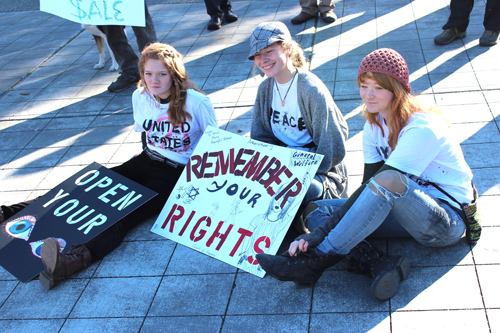
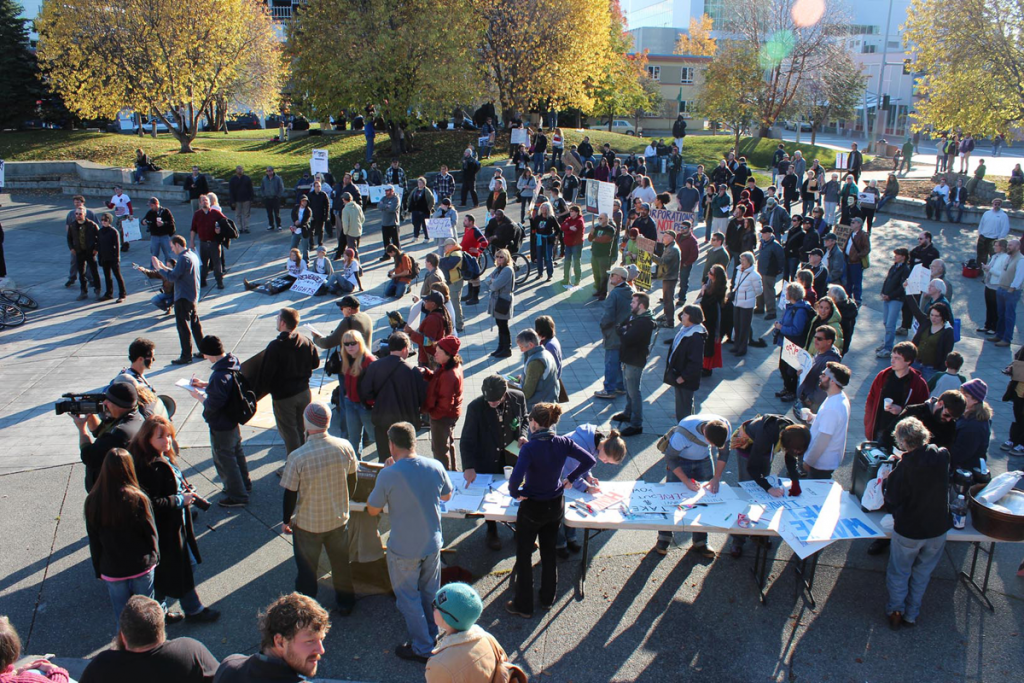
Howard Zinn taught at Spelman College and Boston University where he had an extraordinary influence on his students’ understanding of history and their role in the world. This series highlights Zinn’s lasting impact as a professor. Read more stories and submit your own.



